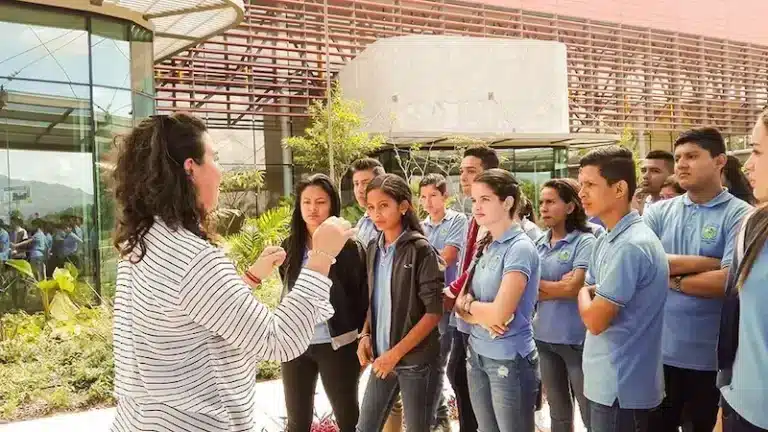Today’s world demands more than inspiring speeches about sustainability; it calls for coherent actions that reflect a genuine commitment to the environment and society.
In a context where corporate reputation is built on authenticity, decisions about where to hold events are not merely logistical matters—they are declarations of values.
Choosing a venue for meetings, conferences, or celebrations that fails to align with sustainable principles exposes brands to what has been called “green dissonance”—the contradiction between what a brand communicates and what it truly does.
A non-sustainable venue reveals the truth behind a brand that merely wears a green mask.
The lessons from the ICCA World Congress 2024 in Abu Dhabi provide a clear perspective on why coherent sustainability decisions are fundamental to the meetings industry. The event demonstrated how brands and associations can align their actions with their principles, avoiding contradictions that erode their credibility and seizing opportunities to lead through consistency.
What may appear to be an internal decision or a financial saving measure can, in fact, become a significant exposure risk by associating a brand with an unsustainable venue.
Sustainability as a Strategic Axis According to ICCA 2024
The ICCA World Congress 2024 highlighted eight key sustainability trends, revealing that sustainability is no longer optional but a core strategic element in the industry. The first trend emphasized is the shift from sustainability as a decorative feature to an essential part of a company’s value proposition. It is no longer enough to implement basic environmental management practices; every action and choice must reflect a genuine, consistent, and long-term commitment. As highlighted during the event, clients now seek more than just services—they want partnerships with venues and suppliers that share their vision of social and environmental responsibility. Coherence is demonstrated not in a brand’s discourse but in the venue choices it makes.
Another major trend identified at ICCA was the reduction of carbon footprints as a cornerstone of sustainable operations. This involves not only minimizing direct environmental impacts but also measuring and transparently communicating results. The adoption of renewable energy sources, the promotion of responsible travel, and proper waste management are no longer optional but essential criteria for venues aiming to attract sustainability-minded companies. Choosing a non-sustainable venue is like packaging a green message in single-use plastic.
For a sustainable company, choosing the right venue is not a cost but an investment in credibility.
From Symbolic to Strategic: Consistent Brands and Events
One of the most significant critiques raised at ICCA was the need to transition from ad hoc sustainable actions to comprehensive strategies. Companies that adopt symbolic or isolated measures risk being perceived as inconsistent, especially if these actions are not reflected in critical decisions, such as where they hold their events. In this context, transparency becomes crucial: clients and attendees are not fooled by empty rhetoric; they value verifiable and consistent sustainable practices throughout the value chain.
Costa Rica and its Convention Center (CCCR) stood out at the congress with its “Sustainability Zone,” demonstrating how a venue can become a strategic partner for brands seeking consistency. The CCCR, through its CarbonClear Events By Heroica methodology, ensures that every event held on its premises is firmly oriented toward decarbonization. This involves not only compliance with environmental certifications and efficient waste management systems but also the delivery of verifiable annual sustainability reports. These reports detail the environmental impact of 100% of the events, including carbon footprint measurements and corrective actions implemented, enabling organizers to communicate their environmental achievements transparently. CarbonClear Events transforms each event into a verifiable commitment to sustainability and corporate coherence. This approach appeals to sustainability-minded clients, who not only seek to minimize their environmental impact but also use their events’ achievements as part of their brand narrative. As one congress attendee noted, “A brand’s sustainability lies not in its words but in its choices.”
The Danger of Inconsistency: Brands Exposed
Holding events in venues without a clear sustainability policy can have serious reputational consequences for a brand.
What may seem like an internal or cost-saving decision can become a significant risk of public exposure.
A venue lacking proper waste control or carbon footprint measurements reflects a lack of commitment that is hard to miss for attentive collaborators and clients.
An unsustainable venue shouts louder than an empty sustainability speech.
The genuine interest of brands in demonstrating consistency is not a passing trend. In fact, ICCA 2024 reported that 45% of attendees identified the sustainability hub as the most relevant part of the congress, surpassing even key areas such as technology and innovation. This demonstrates that consumers and business partners no longer tolerate contradictions between what a company preaches and what it actually does. Brands that continue to choose unsustainable venues ultimately risk their credibility.
Selecting a venue for events that does not measure its environmental impact is a luxury brands can no longer afford.
The decisions brands make about where to hold their events speak as loudly as their advertising campaigns or sustainability reports. The meetings industry provides a powerful platform to demonstrate commitment to environmental and social responsibility, but only if choices align with the promoted values. As discussed at the ICCA World Congress 2024, sustainability has evolved from an optional practice to the core of a brand’s value proposition.
A Unique Opportunity: Leading Through Consistent Actions
Companies now have a unique opportunity: to prove their sustainability not just through words but also through concrete actions, such as selecting consistent venues.
Truly sustainable brands do not contradict themselves when choosing where to meet.
In this new era, sustainability is a standard that defines corporate credibility, and consistency in every decision is the key to maintaining it.
Source:
Snapsight. (2024). Intelligence: Trends from ICCA World Congress 2024. Retrieved from https://www.snapsight.com/live-channel/l/e2108597-9aa5-4d2c-a489-3db8a8186575/attendee/intelligence
General Manager





